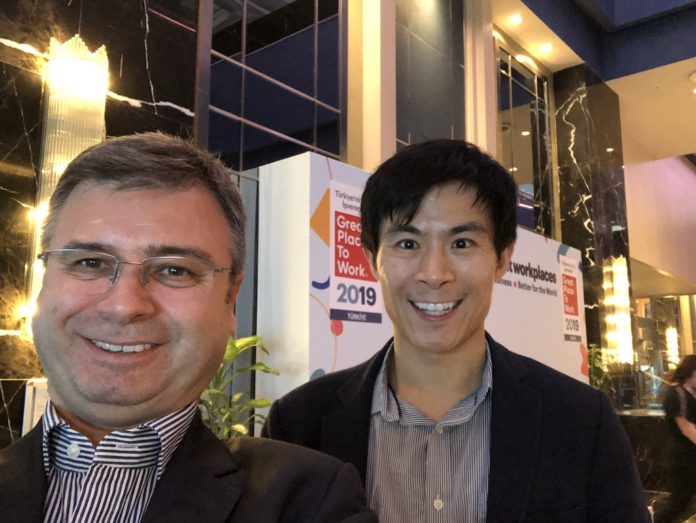I had a chance to talk with Alex Edmans who is Professor of Finance on London Business School when he was at GPTW ‘Great Place To Work’ 2019 awards summit in Istanbul.
– Nice to meet you, Alex. It’s your turn to talk. There were lots of things in your presentation, like the purpose of business profit and the meaning of equality, etc. What’s the purpose of a business?
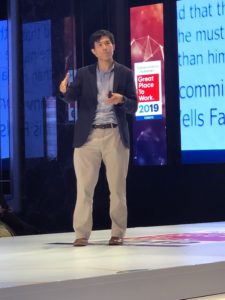 – The purpose of a business is not to earn a profit. People often think that profit is the end goal, and it’s commonly known as the bottom line. I disagree with that. I think that the purpose of a business is to make products that transform customers’ lives for the better. It’s to provide employees with a healthy and enriching place to work and to preserve the environment for future generations. In short, the purpose of business is to serve society.
– The purpose of a business is not to earn a profit. People often think that profit is the end goal, and it’s commonly known as the bottom line. I disagree with that. I think that the purpose of a business is to make products that transform customers’ lives for the better. It’s to provide employees with a healthy and enriching place to work and to preserve the environment for future generations. In short, the purpose of business is to serve society.
What my talk was emphasizing is that this is not at the expense of profits. Profits do arise as a result of being purposeful. So, let’s take Merck for example, the US pharmaceuticals company. Their goal was always to advance science. I gave the example of how they develop penicillin and then gave the secrets of how to make it to their competitors to help in the war. There are many other examples at the moment as Merck provides drug ivermectin to cure river blindness for free in Africa. As a result of that, Merck has become very profitable. Why? Because it attracts great workers, who want to work for a company that changes society. But notice that is only the result. It was not the primary objective. So, the main objective is to serve society, and if you do that, then you become profitable.
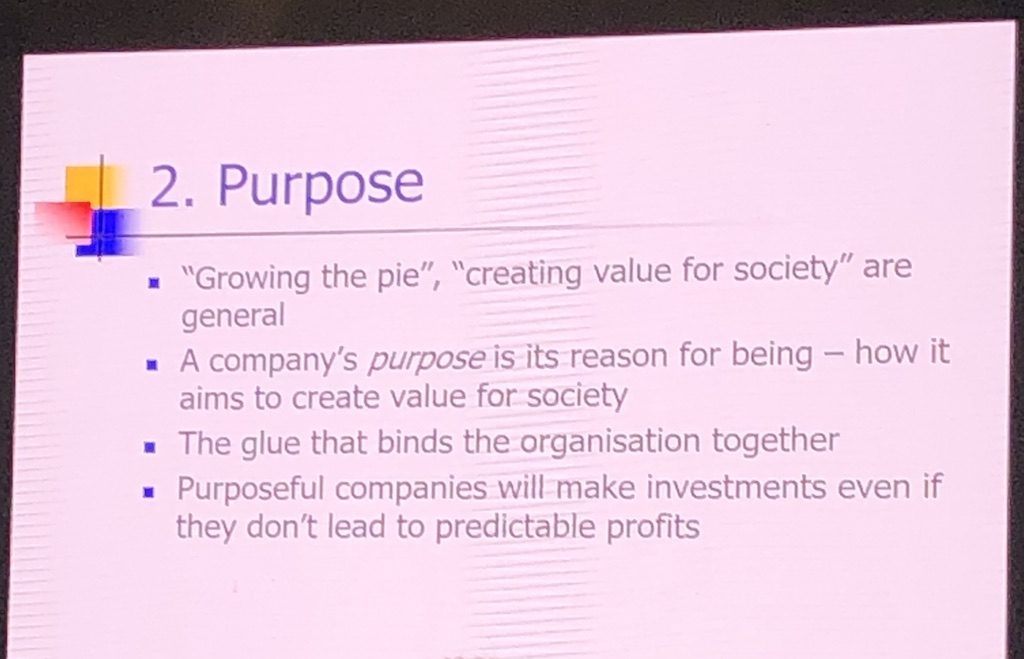 – At the end of the presentation, you also talked about shareholder rights. Could you tell us about that?
– At the end of the presentation, you also talked about shareholder rights. Could you tell us about that?
– The goal of my research was to show that if you are a purposeful company, you actually end up doing better for shareholders. That’s really interesting. Because I’m a finance professor and often finance is the enemy of purpose. Because when companies want to invest in purpose, the finance director saying ‘No, this is costing a lot of money.’ But my research shows that any finance director with that attitude is bad at their job. Because the evidence shows that if you treat with stakeholders better, then you perform better in the long term. So, as a shareholder, we need to be willing to support companies that are purposeful rather than just focusing on short-term profits.
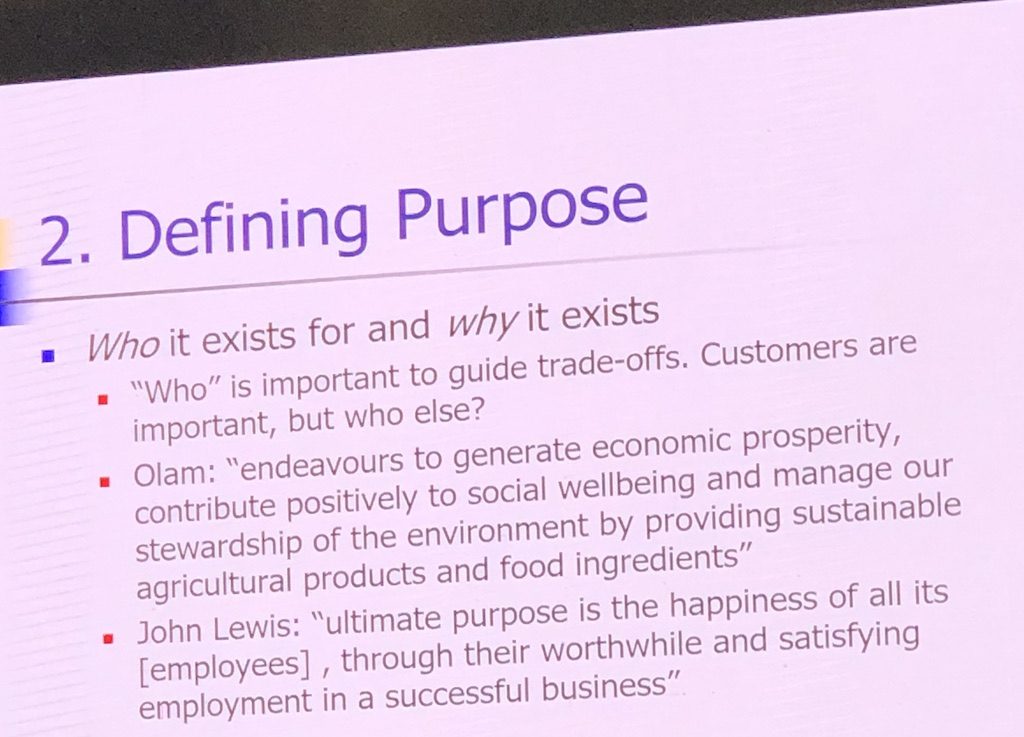 – You talked about sustainability also. What would you like to say about sustainability?
– You talked about sustainability also. What would you like to say about sustainability?
– Sustainability is the idea of running a business for the long term. So often, managers are focusing on just short-term profits. Why? Because they’re getting a bonus based on this year’s profit. And therefore, you can run the business in an unsustainable way. For example, you could choose not to train your workers, not to develop culture, not to invest in research and development. All of that will improve your profits and the short term you’re saving money. But in the long term, that’s going to hurt you. So, sustainability is running the business with a long-term mindset. And, in particular, what my research shows is that companies that treat their workers better do better. But it takes about five years for this to show up in the stock price.
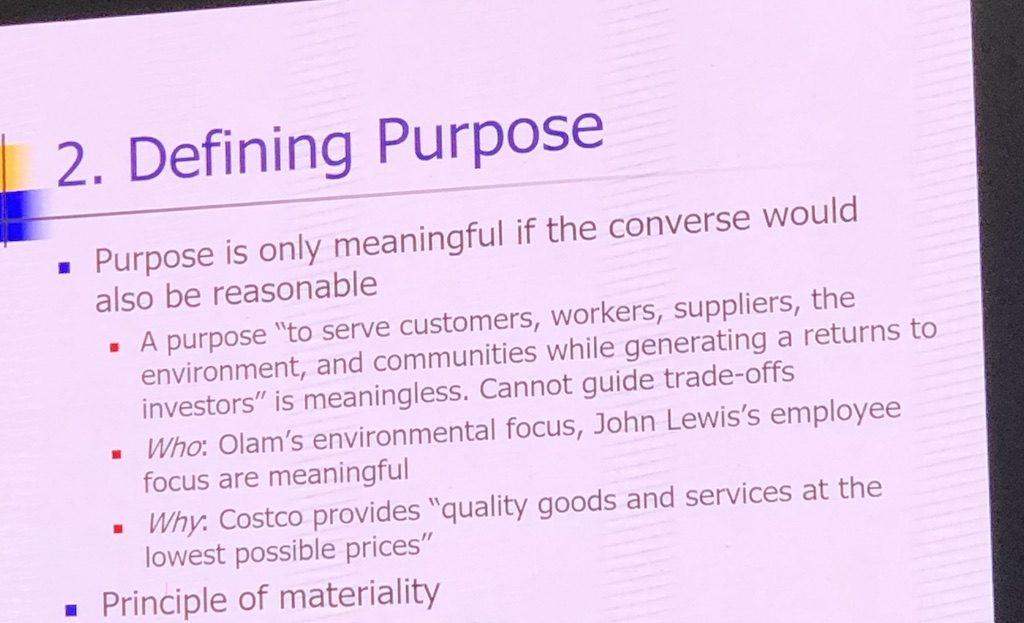 – I’ve noticed a Standards Board materiality map in your presentation. What was it?
– I’ve noticed a Standards Board materiality map in your presentation. What was it?
– What’s important about a purposeful company is you have to be discerning. This doesn’t mean we give all our money away to everybody. Instead, it means that we should focus on giving our money and helping particular stakeholders who are material to you. The materiality map shows for which force it particular industries, what are the most material stakeholders? For example, if you’re in the health care industry, the environment is essential. If you’re in the financial sector, customer trust and data is important. What the evidence shows is that if you are to invest in the material stakeholders owning you generate higher returns. But if you invest in everybody, then you actually don’t do better. It means that you have to be discerning not just give your money away, but think about who are the stakeholders their most important and investing them alone.
– Now, another topic about the values of the great place to work. What makes a great place to work?
– What makes a great place to work is one that views its workers as partners in the organization. Workers are not input nor like war materials or factors of production. They are partners, humans. We often think about the worst human resources. This emphasizes humor, whereas typical managers think about them as resources. What you want to do is view your workers as humans and to invest in their development for the long run. Don’t just think about them as a way of generating profits for you.
– The last question is out of this great place to work business because last week I had a meeting with somebody and we talked about the post-truth world. What are you going to tell us about what to trust in a post-truth world?
– Well, I would encourage you to all look at my TED Talk what to trust in a post-truth world.
Why I wrote that is there’s so many evidence and data out there. You can find data to support anything you want to promote. I come sure. For example, I like drinking a glass of wine at the moment. I’m sure I could find any studies showing that wine is good for my health just because I want to and to have an excuse to drink wine. Some people find evidence saying oh exercise as bad for you as an excuse not to exercise. All of the talk is the show what is the evidence that we can trust and what is the evidence that we cannot trust so that we can be discerning about.
– You showed a person who smoked lots of a hundred cigarettes.
– He smokes I think 20 cigarettes a day, and he lives into a hundred. So, people might say ‘Oh, because of this man, smoking is fine.’ But that doesn’t mean anything because you can always find one outlier and one exception. The goal of my research is to show that many companies that treat their workers well do better. It’s not just one company.
– Could you say the few words to our audience?
– I think the evidence that I find applies to Turkey as much to any country. So, my results are not specific to the US or the UK. They are true everywhere. At everywhere, if you want a company, if you treat your workers as human beings as partners in the organization, not just inputs to make money for you, then this company is going to be more purposeful, more sustainable and ultimately more profitable in the long run.
– Thank you very much.
– Thank you very much. It was really good.
Sinan Oymacı


